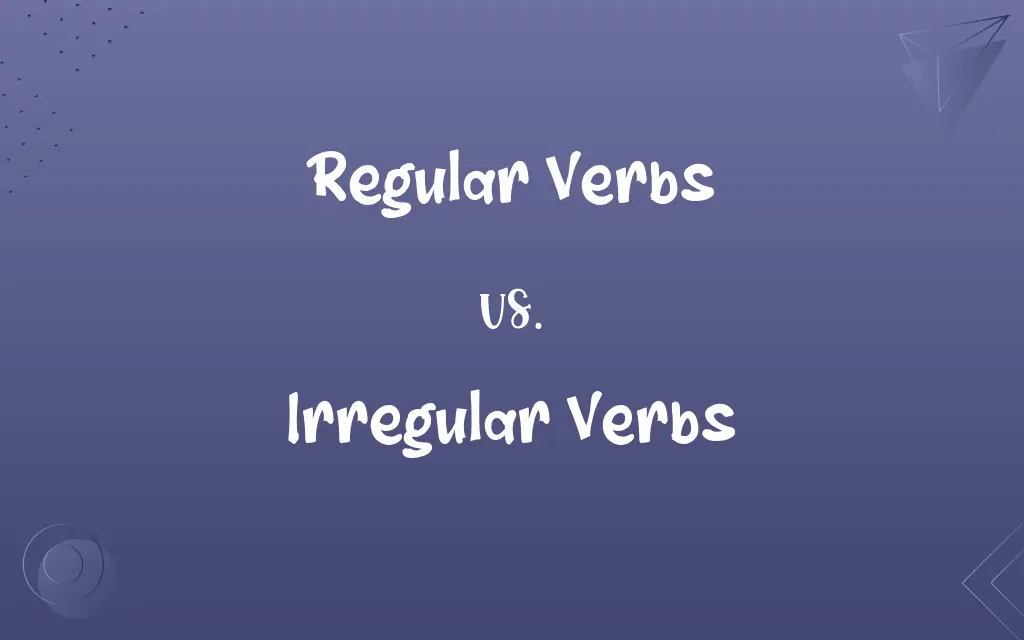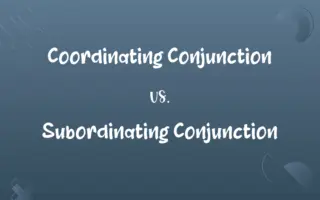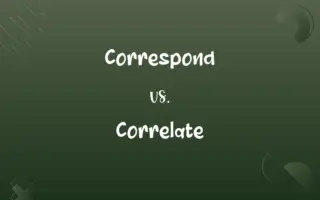Regular Verbs vs. Irregular Verbs: Know the Difference

By Shumaila Saeed || Published on January 18, 2024
Regular verbs form their past tense and past participle by adding -ed, while irregular verbs form these forms in various ways.

Key Differences
Regular verbs are characterized by their predictable pattern in forming the past tense and past participle, typically by adding -ed or -d to the base form. For example, 'talk' becomes 'talked'. Irregular verbs, on the other hand, do not follow this standard pattern. Their past tense and past participle forms can vary significantly from the base form, such as 'run' becoming 'ran'.
Shumaila Saeed
Jan 18, 2024
The use of regular verbs in English grammar is more systematic and easier to learn due to their consistent conjugation rules. For instance, 'play' turns into 'played'. Irregular verbs require memorization as they do not adhere to a single rule. Examples include 'go' turning into 'went' and 'be' becoming 'been'.
Shumaila Saeed
Jan 18, 2024
In language evolution, regular verbs often represent newer additions to the English language. Their formation follows a more modern linguistic pattern, as seen in 'want' changing to 'wanted'. Irregular verbs, however, are generally older and have roots in historical forms of English. This is evident in words like 'sing', which changes to 'sang'.
Shumaila Saeed
Jan 18, 2024
Regular verbs tend to be more numerous in the English language, making them more commonly used in everyday speech and writing, such as 'work' becoming 'worked'. Irregular verbs, while fewer in number, include some of the most commonly used verbs in the English language, such as 'be', 'have', and 'do'.
Shumaila Saeed
Jan 18, 2024
In teaching English, especially to non-native speakers, regular verbs are often introduced first due to their simplicity and uniformity, like 'clean' becoming 'cleaned'. Irregular verbs are introduced later as they require a different approach to learning, involving more memorization and practice, as seen in 'eat' changing to 'ate'.
Shumaila Saeed
Jan 18, 2024
ADVERTISEMENT
Comparison Chart
Past Tense Formation
Add -ed or -d (e.g., 'ask' -> 'asked')
Various forms (e.g., 'go' -> 'went')
Shumaila Saeed
Jan 18, 2024
Past Participle Formation
Same as past tense (e.g., 'talk' -> 'talked')
Often different (e.g., 'see' -> 'seen')
Shumaila Saeed
Jan 18, 2024
Evolution
Generally newer linguistic additions
Often older, historical forms
Shumaila Saeed
Jan 18, 2024
ADVERTISEMENT
Regular Verbs and Irregular Verbs Definitions
Regular Verbs
Regular verbs adhere to a general grammatical rule.
She danced gracefully.
Shumaila Saeed
Jan 05, 2024
Irregular Verbs
Irregular verbs do not follow standard conjugation rules.
She ate the whole cake.
Shumaila Saeed
Jan 05, 2024
Regular Verbs
Regular verbs maintain a consistent ending in different tenses.
She cooked a delicious meal.
Shumaila Saeed
Jan 05, 2024
Irregular Verbs
Learning irregular verbs often involves memorizing each form.
She has written a novel.
Shumaila Saeed
Jan 05, 2024
Regular Verbs
Verbs that form their past tense by adding -ed.
I walked to the store.
Shumaila Saeed
Jan 05, 2024
ADVERTISEMENT
Irregular Verbs
Many irregular verbs retain older forms of English.
They sang beautifully.
Shumaila Saeed
Jan 05, 2024
Regular Verbs
Regular verbs follow a simple pattern for tense changes.
He jumped over the fence.
Shumaila Saeed
Jan 05, 2024
Irregular Verbs
Each irregular verb has its own conjugation pattern.
He swam across the lake.
Shumaila Saeed
Jan 05, 2024
Regular Verbs
Regular verbs are straightforward for English learners.
They painted the wall blue.
Shumaila Saeed
Jan 05, 2024
Irregular Verbs
Verbs that change form in unpredictable ways for past tenses.
He drove to work.
Shumaila Saeed
Jan 05, 2024
Repeatedly Asked Queries
What is a regular verb?
A regular verb forms its past tense and past participle by adding -ed to the base form.
Shumaila Saeed
Jan 18, 2024
Can you give an example of a regular verb?
'Play' is a regular verb; it becomes 'played' in past tense.
Shumaila Saeed
Jan 18, 2024
Why are regular verbs easier to learn?
Regular verbs follow a consistent pattern, making them more predictable and easier to memorize.
Shumaila Saeed
Jan 18, 2024
Is 'go' a regular or irregular verb?
'Go' is irregular; it becomes 'went' in past tense.
Shumaila Saeed
Jan 18, 2024
What makes a verb irregular?
Irregular verbs form their past tense and past participle in ways that are not standard, often changing the vowel or the entire word.
Shumaila Saeed
Jan 18, 2024
Are irregular verbs common in everyday English?
Yes, many frequently used verbs are irregular.
Shumaila Saeed
Jan 18, 2024
How can I identify an irregular verb?
By noticing that its past forms don't follow the standard -ed ending.
Shumaila Saeed
Jan 18, 2024
Do irregular verbs have a common pattern?
No, each irregular verb has its own unique conjugation.
Shumaila Saeed
Jan 18, 2024
Are new verbs added to English usually regular or irregular?
New verbs are typically regular.
Shumaila Saeed
Jan 18, 2024
Can an irregular verb become regular over time?
Yes, language evolution can lead to this change.
Shumaila Saeed
Jan 18, 2024
Do all regular verbs end in -ed in the past tense?
Almost all, but some may end in -d if the base form already ends in -e.
Shumaila Saeed
Jan 18, 2024
Why are some verbs irregular?
Often due to historical linguistic developments.
Shumaila Saeed
Jan 18, 2024
Are there more regular or irregular verbs in English?
There are more regular verbs.
Shumaila Saeed
Jan 18, 2024
Do all languages have regular and irregular verbs?
This concept varies, but many languages have similar distinctions.
Shumaila Saeed
Jan 18, 2024
Is it necessary to memorize all irregular verbs?
Familiarity with common irregular verbs is important, but not all need to be memorized.
Shumaila Saeed
Jan 18, 2024
Can context help in identifying the tense of an irregular verb?
Yes, understanding the context can often indicate the tense, even if the verb form is unfamiliar.
Shumaila Saeed
Jan 18, 2024
Can the same verb be both regular and irregular?
Yes, some verbs can be conjugated in both ways, though this is rare.
Shumaila Saeed
Jan 18, 2024
How do teachers introduce these verbs to students?
Regular verbs are usually taught first for their simplicity, followed by common irregular verbs.
Shumaila Saeed
Jan 18, 2024
Do regular verbs change their vowel in past tense?
No, they typically retain the base form's vowel.
Shumaila Saeed
Jan 18, 2024
Share this page
Link for your blog / website
HTML
Link to share via messenger
About Author
Written by
Shumaila SaeedShumaila Saeed, an expert content creator with 6 years of experience, specializes in distilling complex topics into easily digestible comparisons, shining a light on the nuances that both inform and educate readers with clarity and accuracy.





































































